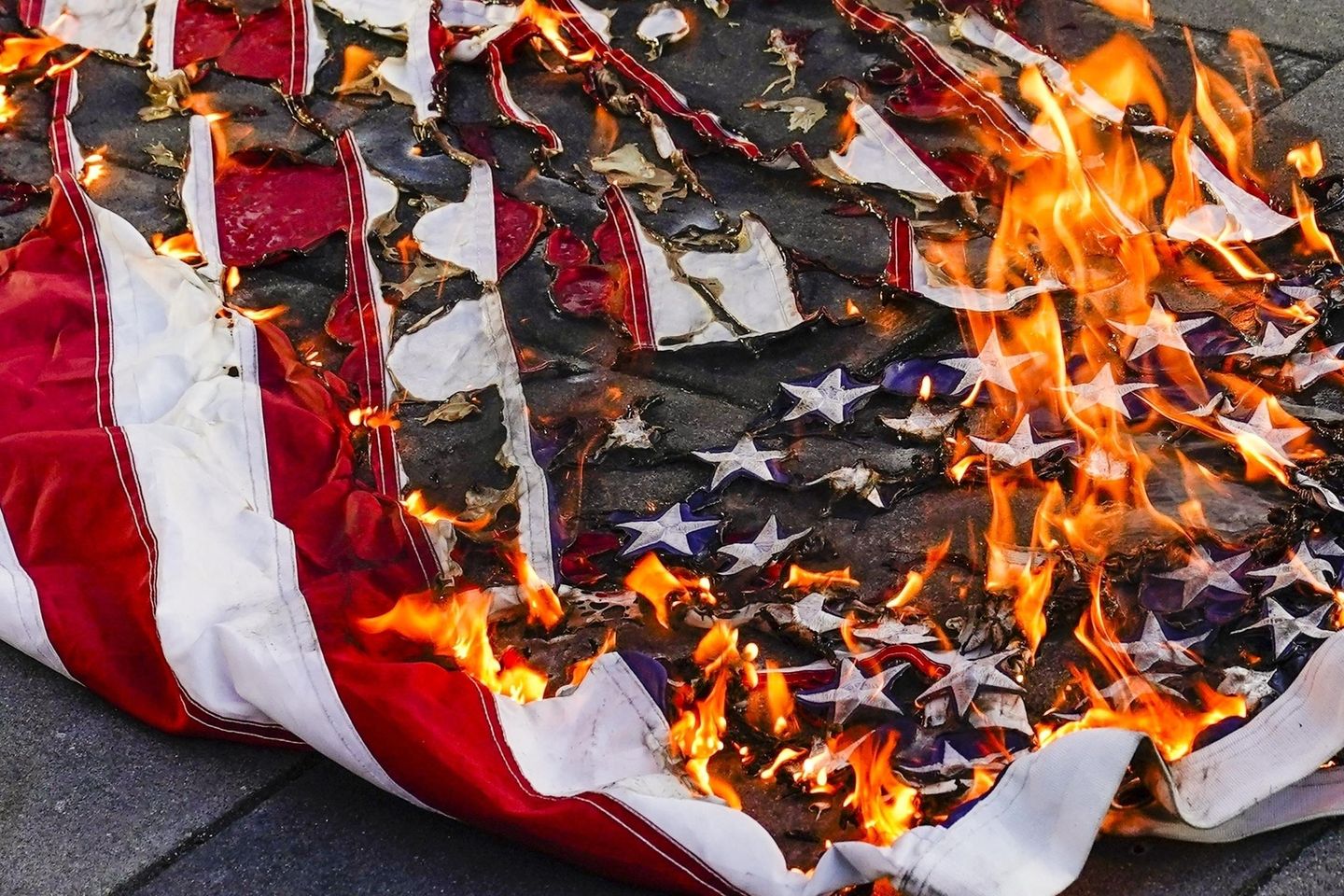
President Trump has demanded a crackdown on burning the American flag, but legal experts said he’ll have a hard time trying to find cases where he can actually win convictions.
Mr. Trump’s order on Monday acknowledged the Supreme Court’s previous rulings protecting flag burning as free speech but said there’s still room to prosecute when the burning is done to incite violence. He ordered the Department of Justice to find and prosecute those cases.
Proving incitement will be tough, though.
“It is a high bar,” said Jeffrey D. Swartz, professor emeritus at Cooley Law School. “Especially where we are talking about political speech — that’s a very high bar.”
Mr. Swartz said the executive order appears to suggest that burning a flag will incite people who oppose the burning to act violently. But he said all political expression invites dissent.
“He really wants to, by doing this, take probably the most outspoken of protest speech and say, ‘You can’t do it.’ And I don’t see this court doing that,” Mr. Swartz said. “Burning a flag is pure speech.”
Mr. Trump acknowledged in his order that he’s testing the boundaries.
“To the maximum extent permitted by the Constitution, the attorney general shall vigorously prosecute those who violate our laws in ways that involve desecrating the American flag, and may pursue litigation to clarify the scope of the First Amendment exceptions in this area,” the president said.
The Supreme Court grappled with the issue in 1989, when it ruled 5-4 in favor of Gregory Johnson, who had burned a flag in 1984 as part of a demonstration against the Republican National Convention in Dallas. The ruling struck down a Texas law against burning the flag to incite anger in others.
A year later, the high court issued a similar ruling against a federal law banning flag burning.
Legal experts said the court was aware of just the sort of issue Mr. Trump is raising — when flag-burning incites others — and still found it to be symbolic speech, protected by the First Amendment.
Mary Graw, a professor at The Catholic University of America, said the order “lacks sense” and appears to be suggesting the Justice Department engage in unlawful action to see if the high court would take an opportunity to change the law.
“There is not a lack of clarity in this area of the law,” Ms. Graw said.
The National Association of Criminal Defense Lawyers vowed to fight any prosecutions that arise from Mr. Trump’s order.
“The Supreme Court has repeatedly affirmed that flag burning is a protected form of political speech, a decision that even the late conservative Justice Antonin Scalia supported,” said Lisa Wayne, the group’s executive director. “This new executive order is a reckless abuse of power that asks the courts to unring a bell that has been ringing for over 30 years. It’s a waste of time and taxpayer money on a legal battle that has already been won.”
Eugene Volokh, a law professor at the University of California, Los Angeles and a leading First Amendment scholar, said the president’s latest move reeks of discrimination on the basis of viewpoint, which is illegal.
“I doubt the Court will overturn Texas v. Johnson,” Mr. Volokh said in an email to The Washington Times.
He wrote on his legal blog, “The Volokh Conspiracy,” that the government could write a law that penalizes people who damage government property, such as a flag stolen from a federal building, or that bans burning a flag in a fire hazard zone on federal property.
But Mr. Trump’s order expressly targets flag-burning because it is “offensive and provocative.” That, Mr. Volokh wrote, is precisely what the Supreme Court ruled to be protected speech.
Mr. Trump’s order also directs prosecutors to search for other ways that burning a flag might violate state or local ordinances.
That, too, has been tried in the past.
In 2019, Mr. Johnson, the same man who won the landmark 1989 Supreme Court case, was charged in Washington, D.C., with disorderly conduct and a fire code violation after burning a flag outside the White House in protest of Mr. Trump’s big Independence Day celebration that year.
The case was dismissed after the American Civil Liberties Union interceded and challenged the prosecution as unfounded.
• Jeff Mordock contributed to this report.











